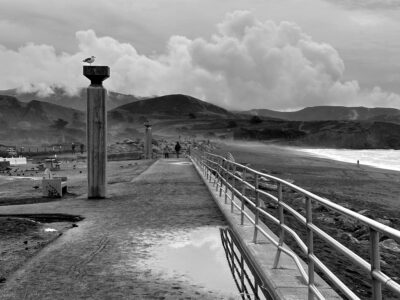Birthing Respect
 I was a whale lawyer for years (or, more correctly, a lawyer for people working to protect whales and their habitat). I therefore can’t resist the urge to link to this terrific piece in the NY Times magazine on the developing relationship between gray whales and their human fans in Laguna San Ignacio, one of the few remaining gray whale nurseries in the eastern Pacific. Each year, whales migrate thousands of miles down the coast of North America, from Alaska to the Baja peninsula in Mexico, to give birth to their calves in sheltered, warm waters and stay for a few months of sunshine and growth.
I was a whale lawyer for years (or, more correctly, a lawyer for people working to protect whales and their habitat). I therefore can’t resist the urge to link to this terrific piece in the NY Times magazine on the developing relationship between gray whales and their human fans in Laguna San Ignacio, one of the few remaining gray whale nurseries in the eastern Pacific. Each year, whales migrate thousands of miles down the coast of North America, from Alaska to the Baja peninsula in Mexico, to give birth to their calves in sheltered, warm waters and stay for a few months of sunshine and growth.
Early in the 20th century, the lagoon was discovered and exploited by commercial whalers as an easy target. Gray whale moms grew a reputation for fiercely (if futilely) defending themselves and their young by ramming boats and earning the moniker “devils.” But today, whaling having been banned for decades, things are a little different. This is how the author of the piece describes a moment, on a recent trip to the lagoon, in a small boat out on the water:
[W]ithin moments, the mother was surfacing again off to our stern and doubling back in our direction, but this time with her newborn male in tow: a miniature version of herself — if two tons of anything can be referred to as miniature — the calf’s skin still shiny and smooth. The baby gray glided up to the boat’s edge, and then the whole of his long, hornbill-shaped head was rising up out of the water directly beside me, a huge, ovoid eye slowly opening to take me in. I’d never felt so beheld in my life.
I’ve made this same trip and felt this awe, too, at whale mothers and calves instigating encounters with seeming curiousity. Feeling and smelling exhaled whale breath is something I’ll never forget. I’ve also spent many hours collecting declarations, in court cases, from passionate people for whom encounters with wildlife provide some of their most exciting and meaningful memories. The environmental movement has rightfully, and thankfully, grown to encompass neighborhood public health work, green economic development, and a search for environmental justice for all communities. But it was probably born in moments like these in the gray whale nursery.
Reader Comments
One Reply to “Birthing Respect”
Comments are closed.







In taking a little break from studying for the California Bar next week, feeling like I made a huge mistake going to law school (test stress, loan stress, the economy) I clicked on your whale post. Law will be a second career for me and the sole reason I decided to go into law is to protect natural resources. Moments like the one you spoke of remind me of why I am doing this and why I must prevail. Thanks, for sharing.